WordPress is essentially internet infrastructure. It’s widely used, generally stable, and doesn’t tend to generate many splashy headlines as a result.
Technology
The messy WordPress drama, explained

But over the last week, the WordPress community has swept up into a battle over the ethos of the platform. Last week, WordPress cofounder Matt Mullenweg came out with a harsh attack on WP Engine, a major WordPress hosting provider, calling the company a “cancer” to the community. The statement has cracked open a public debate surrounding how profit-driven companies can and can’t use open-source software — and if they’re obligated to contribute something to the projects they use in return.
The conflict has escalated in the days since with a barrage of legal threats and has left swaths of website operators caught in the crossfire of a conflict beyond their control. WP Engine customers were cut off from accessing WordPress.org’s servers, preventing them from easily updating or installing plugins and themes. And while they’ve been granted a temporary reprieve, WP Engine is now facing a deadline to resolve the conflict or again have their customers’ access fall apart once again.
WP Engine is a third-party hosting company that uses the free, open-source WordPress software to create and sell its own prepackaged WordPress hosting service. Founded in 2010, WP Engine has grown to become a rival to WordPress.com, with more than 200,000 websites using the service to power their online presence.
“Silver Lake doesn’t give a dang about your open source ideals, it just wants return on capital.”
Mullenweg leads two different WordPresses. There’s WordPress.org, the open source project that develops the backbone of the WordPress publishing platform, and then there’s WordPress.com, a company that sells a hosted version of the open-source WordPress software — just like WP Engine. Mullenweg runs Automattic, which owns WordPress.com. Data suggests that around 43 percent of all websites use WordPress, but it’s not clear how many are hosted by WordPress.com or another party.
Along with selling plans on WordPress.com, Automattic contributes a lot of development effort to the open source project, which itself relies on donations and community contributions to run. According to Mullenweg, the team contributes 3,988 hours per week. The company may not have to pay to use WordPress, but it certainly pays to develop and improve it.
WP Engine operates a bit differently. It says it focuses on investing in the community through sponsorships and encouraging the adoption of the platform. The hosting platform was acquired by the private equity firm Silver Lake in 2018, and Mullenweg views it as a business that profits off of open-source code without giving anything back.
That frustration came to a head last week when Mullenweg took the stage at WordCamp — a WP Engine-sponsored WordPress conference — and took direct aim at WP Engine. “The company is controlled by Silver Lake, a private equity firm with $102 million in assets under management,” Mullenweg said. “Silver Lake doesn’t give a dang about your open source ideals — it just wants return on capital. So, it’s at this point I ask everyone in the WordPress community to go vote with your wallet. Who are you going to give your money to: someone who is going to nourish the ecosystem or someone who is going to frack every bit of value out of it until it withers?”
Mullenweg followed up this statement with a September 21st blog post, where he lambasted WP Engine for contributing just 40 hours per week to the WordPress.org open source project. “WP Engine is setting a poor standard that others may look at and think is ok to replicate. We must set a higher standard to ensure WordPress is here for the next 100 years,” Mullenweg wrote in the blog. He ripped into WP Engine even more, saying it’s “strip-mining the WordPress ecosystem” and giving users a “crappier experience so they can make more money.”
Mullenweg isn’t just defending the ethos of open source — he’s also defending his competing WordPress provider
Mullenweg doesn’t appear to be wrong about WP Engine’s contributions. But WP Engine is ultimately abiding by the rules of WordPress’ open-source license: it’s generally free to use, and WP Engine doesn’t have to give back to the WordPress community just because it’s banking off the open-source code. Of course, it’d be nice if WP Engine did, but nothing requires that it do so.
Complicating this further: Mullenweg isn’t just defending the ethos of open source — he’s also defending his competing WordPress provider. In his blog post, he claims WP Engine is “profiting off of the confusion” caused by the company’s branding. Mullenweg alleges that WP Engine is promising to give customers WordPress but that the company is actually offering a distilled version of the service. He goes on to say WP Engine will need a commercial license for the “unauthorized” use of the WordPress trademark, which is controlled by the WordPress Foundation and later sent a cease and desist letter in an attempt to make the company pay up.
WP Engine isn’t staying silent. It sent a cease and desist letter that tells a very different story of what has been going on behind the scenes. In its letter, WP Engine claims Automattic demanded a “very large sum of money” days before Mullenweg’s keynote at the September 20th WordCamp convention — and if the company didn’t receive it, Mullenweg allegedly threatened to carry out a “scorched earth nuclear approach” toward WP Engine.
WP Engine alleges Mullenweg harassed the company through text messages and calls, with one screenshotted text saying: “If I’m going to make the case to the WP community about why we’re banning WPE I need to do it in my talk tomorrow.” The texts, which Mullenweg confirmed he sent in an interview with Twitch streamer ThePrimeagen, say he prepared several presentation slides for his WordCamp talk, with the working title “How Private Equity can Hollow out and Destroy Open Source Communities, a Story in 4 Parts.”
After WP Engine refused to pay WordPress, the company alleges Mullenweg followed through on his threats. “Mr. Mullenweg’s covert demand that WP Engine hand over tens of millions to his for-profit company Automattic, while publicly masquerading as an altruistic protector of the WordPress community, is disgraceful,” WP Engine’s letter states. “WP Engine will not accede to these unconscionable demands which not only harm WP Engine and its employees, but also threaten the entire WordPress community.”
WordPress.org has now made it clear that it’s going after WP Engine for not only failing to give back to the WordPress project but also for its alleged misuse of the WordPress trademark. Mullenweg now says Automattic has given WP Engine two ways to “pay their fair share”: either by paying a licensing fee or making contributions to the open source WordPress project. “This isn’t a money grab: it’s an expectation that any business making hundreds of millions of dollars off of an open source project ought to give back, and if they don’t, then they can’t use its trademarks,” Mullenweg said.
The WordPress Foundation — the charitable organization that backs the open source WordPress project — is led by Mullenweg and other lesser-known board members who aren’t displayed on its website. It seems the WordPress Foundation has made some tweaks to its trademark guidelines in recent days. As of September 19th, the policy said you are “free” to use the WP abbreviation in “any way you see fit.” But now WordPress has deleted that language, replacing it with a line that says not to use WP “in a way that confuses people. For example, many people think WP Engine is ‘WordPress Engine.’” The updated policy also explicitly states: “If you would like to use the WordPress trademark commercially, please contact Automattic, they have the exclusive license.”
WordPress.org banned WP Engine from accessing its servers free over their “legal claims and litigation” — a move that has made it more difficult for customers to use WP Engine. However, Mullenweg decided to temporarily remove the block just two days later. He’s given WP Engine until October 1st to create their own mirror or resolve the conflict. “Why should WordPress.org provide these services to WP Engine for free, given their attacks on us?” Mullenweg wrote. WP Engine says it only sent a cease and desist order to WordPress and has not yet filed a lawsuit.
When asked about the ban on WP Engine, Automattic spokesperson Megan Fox said in a statement to The Verge that “trademark violations have resulted in the company being blocked from some WordPress resources.” WP Engine pointed The Verge to its statements on X when reached for comment.
The fight has garnered a mix of reactions. On one side, people think WP Engine is in the wrong, with some saying the company should contribute more to the open source project and that its use of “WP” is misleading. On the other, some WordPress community members are calling on Mullenweg to step down and accuse of him abusing his power over WordPress.org and WordPress.com. Others believe the situation could result in a fork of WordPress and brought up concerns about whether WordPress will take action against other companies using the “WP” abbreviation or trademark.
But in a dispute that’s meant to clarify what is and isn’t WordPress, Mullenweg risks blurring the lines even more. WordPress.org and WordPress.com both have a point — but it looks an awful lot like they’re working together to make it.
Technology
Last Hours to Snag up to $600 Off Disrupt 2024 Passes

We’re in the final hours to save up to $600 on TechCrunch Disrupt 2024 tickets! Grab your tickets now and seize this final opportunity for major savings before the countdown to Disrupt 2024 starts. This special discount offer ends tonight at 11:59 p.m. PT.
Join a global community of over 10,000 tech, startup, and VC leaders from October 28-30 at Moscone West in San Francisco. Experience one of the most awaited tech events of the year.
Secure your ticket savings before the offer ends tonight.
Reasons to attend Disrupt 2024
In addition to networking with over 10,000 tech, startup, and VC leaders at Disrupt 2024, you can learn from over 250 industry experts featured on six industry stages and participate in over 200 deep-dive sessions.
Speaker Sneak Peak
- Alex Pall and Drew Taggart from The Chainsmokers, Partners and Co-Founders, MANTIS Venture Capital
- Ali Ghodsi, Co-Founder and CEO, Databricks
- Bridgit Mendler, CEO, Northwood Space
- Colin Kaepernick, Founder and CEO, Lumi
- Denise Dresser, CEO, Slack from Salesforce
- Erin and Sara Foster, Co-Founders and General Partners, Oversubscribed Ventures
- Peter Beck, Founder and CEO, Rocket Lab
- Mary Barra, Chair and CEO, General Motors
- Vinod Khosla, Founder and Partner, Khosla Ventures
- Wassym Bensaid, Chief Software Officer, Rivian
Meet the rest of our speaker lineup.
Unmatched networking
Make valuable connections at Disrupt 2024 by exploring the bustling Expo Hall, joining 1:1 or small group Braindate meetings, or attending the dynamic Side Events taking place after hours outside of the venue. There are countless ways to build the right network to help you succeed.
Deep-dive sessions
Dive into over 200 Roundtable and Breakout Sessions hosted by industry leaders, crafted to ignite meaningful conversations about the pressing issues that today’s entrepreneurs and professionals encounter.
Startup Battlefield
Be sure to catch the excitement of Startup Battlefield 200, a highlight of Disrupt where 200 hand-picked pre-Series A startups present their groundbreaking ideas to a panel of prominent VC judges. They’ll be competing for a $100,000 equity-free prize and the prestigious Disrupt Cup.
Secure your discount before it’s gone
Time is running out to save up to $600 on Disrupt 2024 tickets! Don’t delay — claim your discount before this deal ends tonight at 11:59 p.m. PT. Click here to save.
Servers computers
Dell Rack Server 1U: Dell PowerEdge R640 Server | Price/Cost

Infinian Technology Dealer, Distributor and Partner of Dell PowerEdge R640 Server Provider in India – Bangalore, Chennai for Price/Cost Call: 9739091119
source
Technology
Arc browser adds security bulletins and bug bounties

Arc creator The Browser Company has officially started a bug bounty program to keep its growing Chromium-based browser’s security in check. The company is also launching a new security bulletin to maintain “transparent and proactive communication” with users and researchers on bug fixes and reports.
These security revisions followed a devastating bug a researcher found and reported to the company that would’ve allowed bad actors to insert arbitrary code into anyone’s browser just by knowing their easily findable user ID.
The problem lived inside the Arc Boosts feature that lets you customize any website with CSS and Javascript. On top of its initial mitigations, the company says it now has disabled Boosts with Javascript by default and added a new global toggle to turn Boosts off completely in Arc version 1.61.2.
The researcher, known as xyz3va, was initially paid a $2,000 bounty for the information. Now, with the new program in place, The Browser Company is upping it to $20,000 retroactively. The vulnerability was patched on August 26th.
With the new program, security researchers can submit reports and get rewards based on the bug’s severity. Low severity findings that are “limited scope” or “hard to exploit” could land up to $500, Medium gets up to $2,500, High up to $10,000, and Critical earns the $20,000 ceiling.
The blog post also outlined new practices to find other vulnerabilities, like development guidelines with additional code reviews, adding security-specific code audits, and hiring new staff for the security engineering team.
Servers computers
AZE 42U 45U 48U 52U Data Center Server Rack Containment- Colocation Data Center- 5G Edge Computing
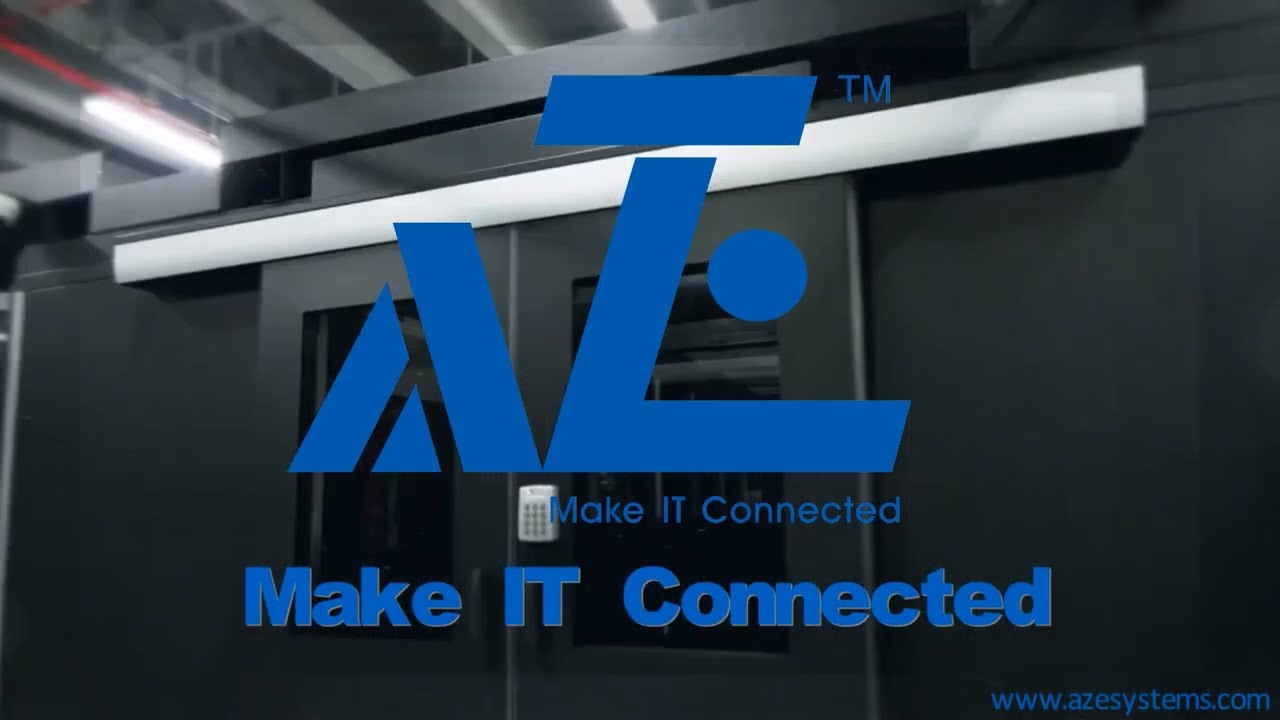
AZE offers customizable hot & cold aisle containment solutions. Save energy, reduce hotspots,improve airflow with data center containment systems.
Aisle containment solution includes modular rack-independent system with the flexibility to maximize efficiency and capacity from the core to the edge for raised floor and slab data centers,it can build to hot or cold aisle containment, our aisle containment system allows you to deploy containment before or after racks are installed to simplify installation and speed deployment of new data center equipment.
For the aisle containment solution, it included several important components listed below:
* Server rack enclosure – AZE provides 42U,45U,48U,52U data center server enclosures, colocation data center cabinets
* Rack PDUs/Power distribution – AZE provides wide selection of 0U,1U basic rack pdu, metered rack pdu and metered-by-outlet switching rack PDU.
* UPS – UPS can be selected from the leading brand in the market to mount in our server racks.
* Cooling – In-rowed or room-level cooling can be fit with our server cabinet enclosures
* Cable management – AZE can provide different options of cable management products.
Please visit https://www.azetelecom.com/data-center-containment.html for more information or contact us sales@azesystems.com for custom your products.
Make IT Connect! AZE can support you to make IT happen
source
Technology
ChatGPT’s 4o-mini Model Just Got a Big Upgrade – Here Are 4 of the Best New Features

OpenAI has enhanced ChatGPT‘s GPT-4o mini model with a bunch of new features, though surprisingly, it does not have any of the usual fanfare. The smaller, faster version of the GPT-4o model, GPT-4o mini, has lacked many of the features of its larger sibling until now, though by its nature, it has less power to complete the same tasks.
The mini model’s efficiency and speed were already attractive enough to many ChatGPT users. And ahead we’re sharing four of the biggest upgrades that bring it closer to par with GPT-4o.
Image Creation
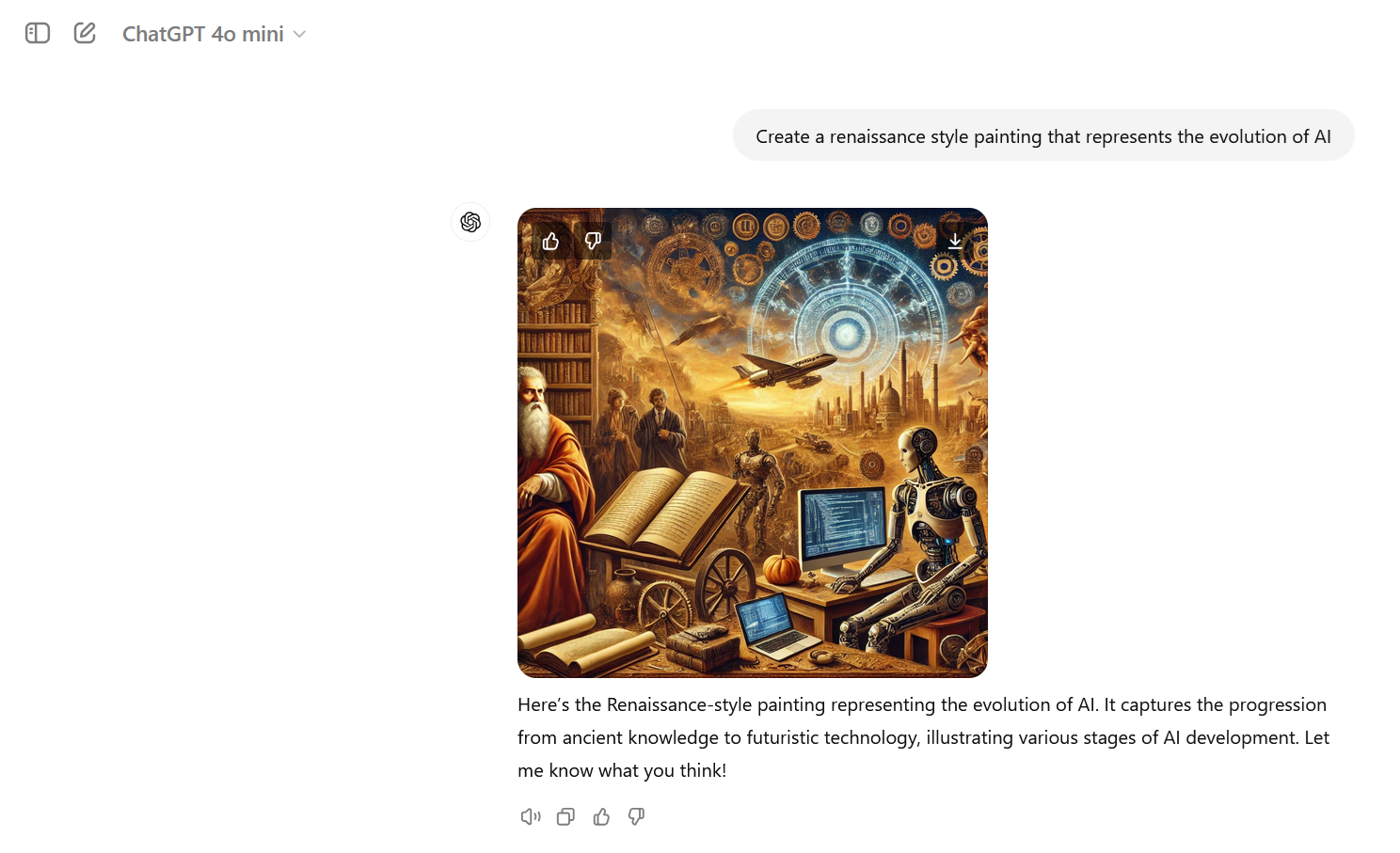
The 4o-mini model can now generate images based on text prompts like the full GPT-4o model. While functionally, it is the same in terms of making visuals out of text on ChatGPT, the model’s size might speed up the production a bit. Further, it’s unlikely to matter when it comes to the output as they both rely on the DALL-E 3 image generation model from OpenAI.
Browsing
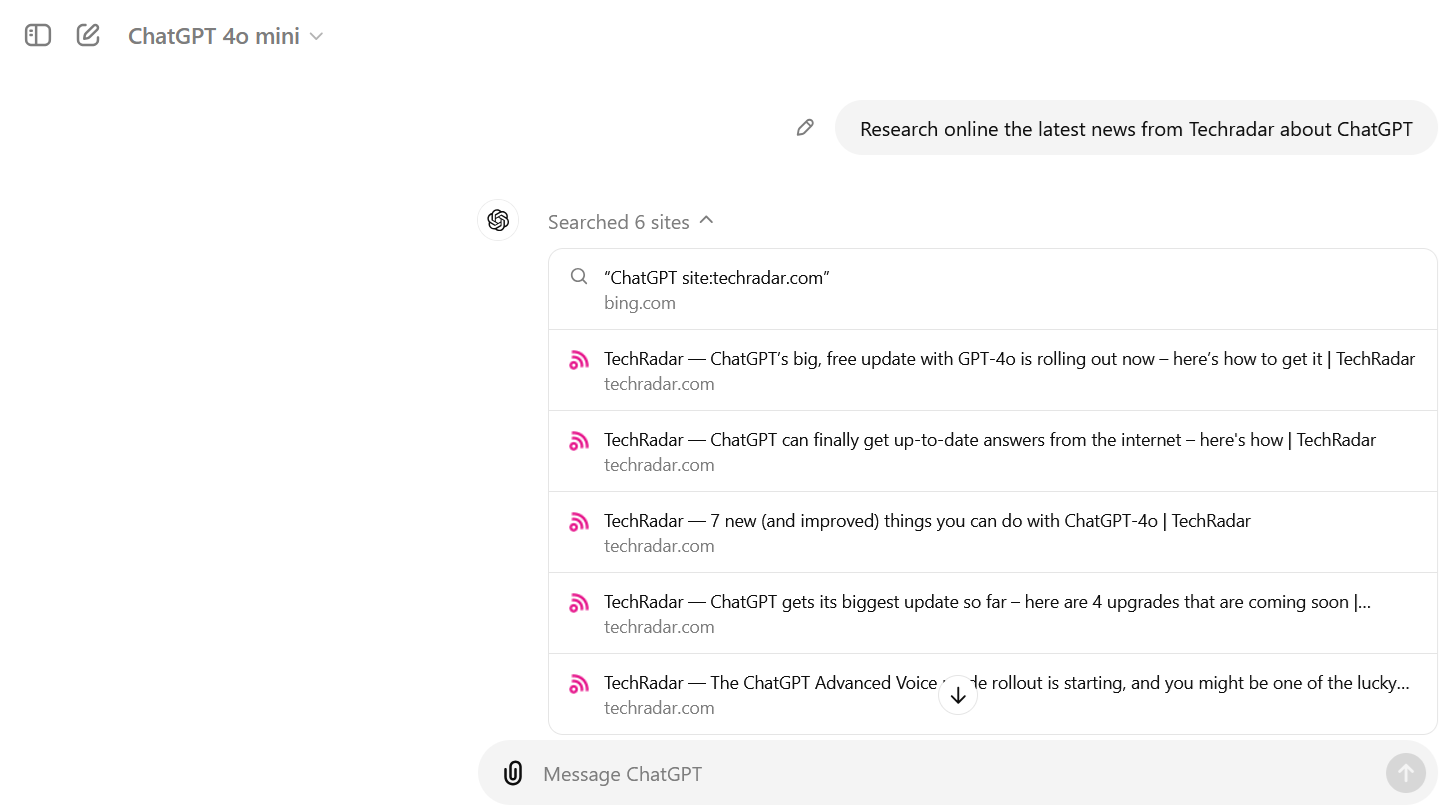
Arguably, one of the biggest limits of the GPT-4o mini model previously was its lack of internet access. Now, you can use the model through ChatGPT to conduct online research faster than with GPT-4o. That means you can get up-to-date information instead of relying solely on its pre-trained knowledge base. It’s crucial to have that option when it comes to fact-checking and comparing information. That brings it up to par with the bigger model but is tied to the speed of the mini model.
Uploading and Understanding
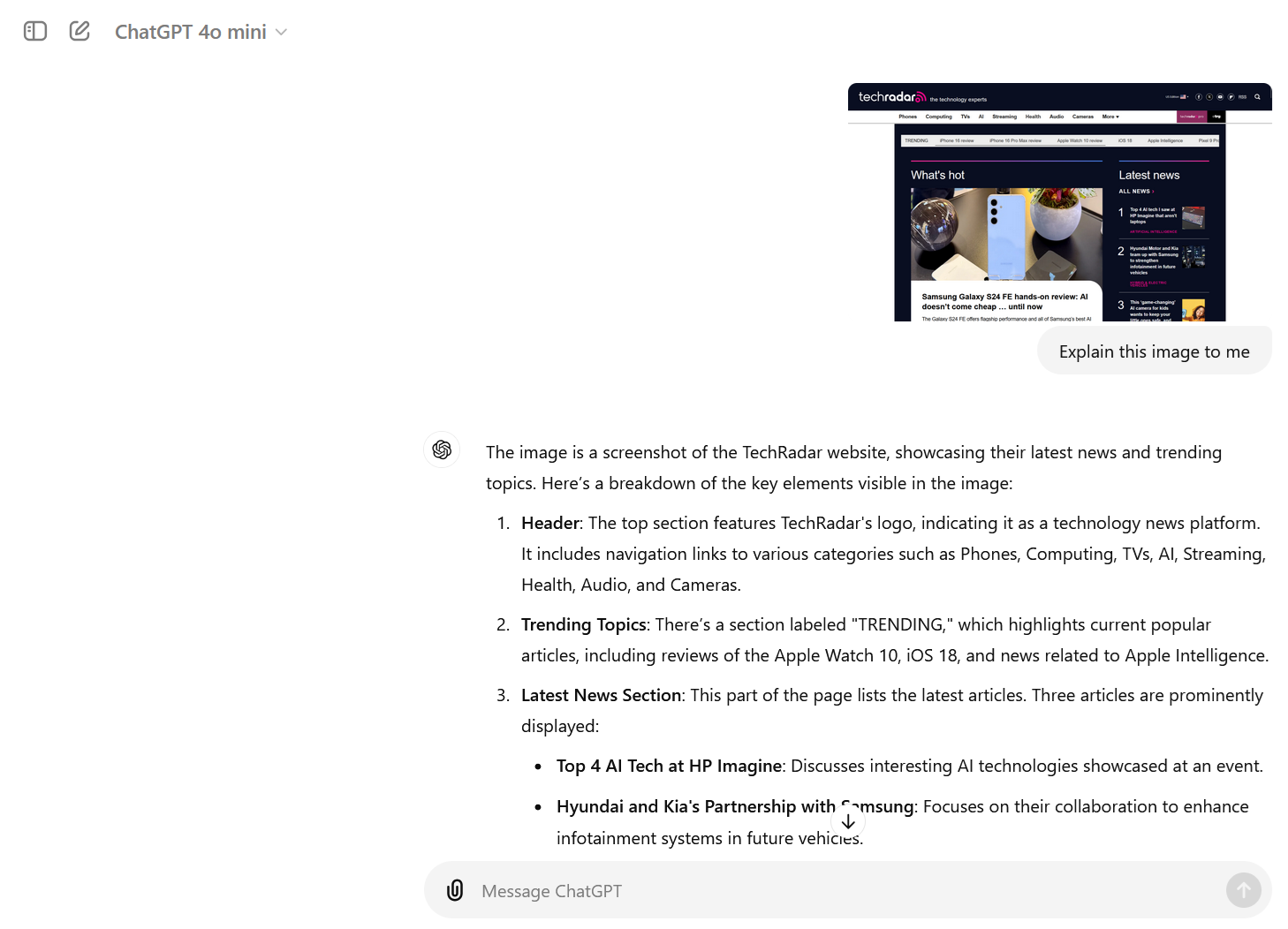
One of the GPT-4o mini model’s most significant limitations compared to the rest of the stable has been its lack of uploading options. Now, ChatGPT users can employ the model to analyze, summarize, and discuss uploaded documents and pictures. The model’s visual processing features let it understand and explain the uploaded images just as it can any texts sent to ChatGPT. This capability makes it easier for users to work with complex visual data for educational or personal needs.
Memory
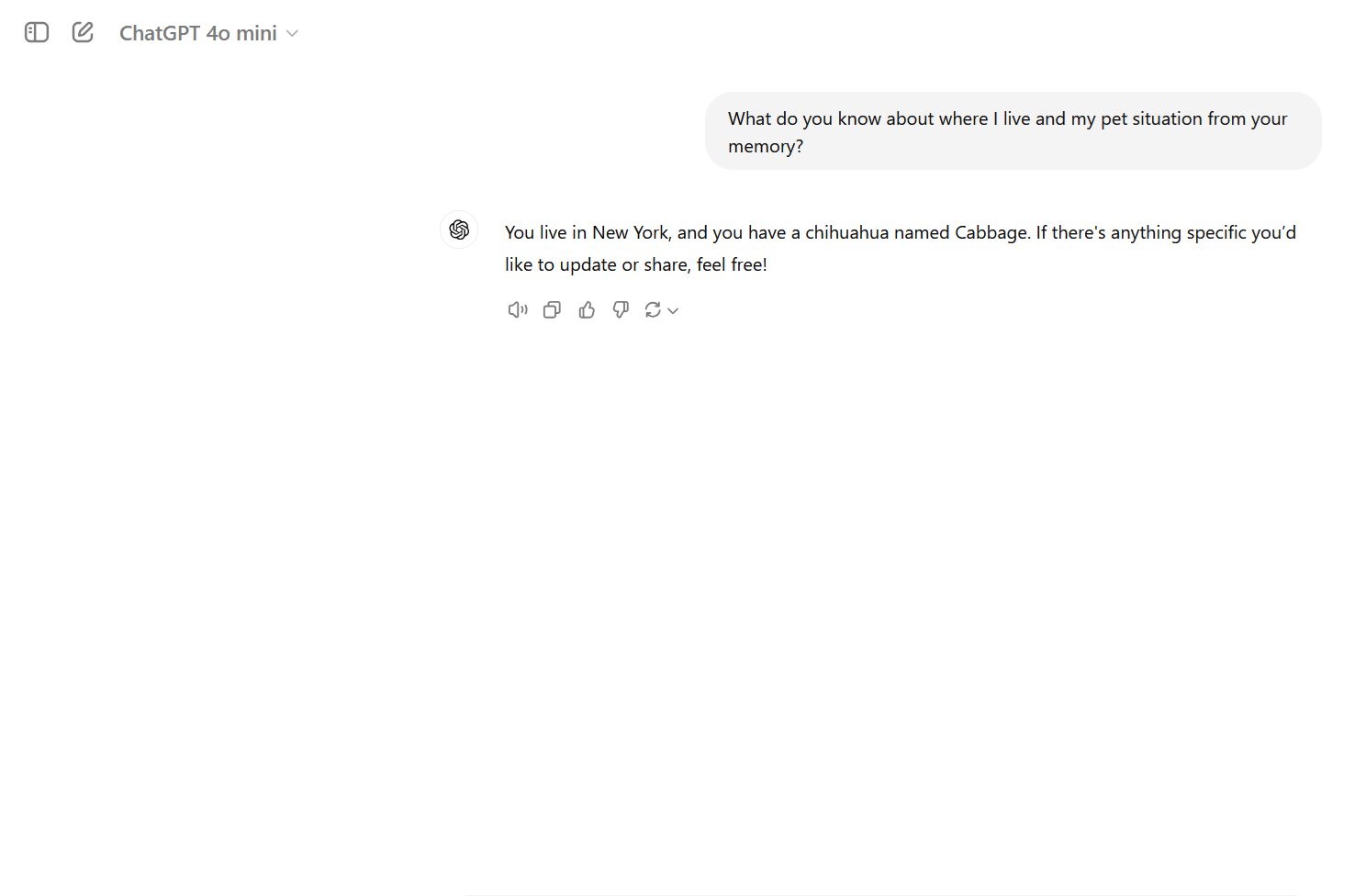
In case you can’t remember all of the new features or forget one of them, the GPT-4o mini model can help, as it now accesses the memory feature available for other ChatGPT models. That allows it to remember previous conversations with specific users and tailor interactions accordingly. So even after ending a talk with ChatGPT through the 4o-mini model, you can come back and get more relevant answers, follow-ups on earlier discussions, and recognition of your preferences. In other words, being mini doesn’t mean it can’t handle long-term interactions.
You might also like…
Technology
Tech Life: X in Brazil

What do social media users do when their preferred platform is banned ?
-

 Womens Workouts4 days ago
Womens Workouts4 days ago3 Day Full Body Women’s Dumbbell Only Workout
-

 News6 days ago
News6 days agoOur millionaire neighbour blocks us from using public footpath & screams at us in street.. it’s like living in a WARZONE – WordupNews
-

 Technology1 week ago
Technology1 week agoWould-be reality TV contestants ‘not looking real’
-

 News1 week ago
News1 week agoYou’re a Hypocrite, And So Am I
-

 Science & Environment1 week ago
Science & Environment1 week agoHyperelastic gel is one of the stretchiest materials known to science
-

 Science & Environment1 week ago
Science & Environment1 week ago‘Running of the bulls’ festival crowds move like charged particles
-

 Sport1 week ago
Sport1 week agoJoshua vs Dubois: Chris Eubank Jr says ‘AJ’ could beat Tyson Fury and any other heavyweight in the world
-

 Science & Environment1 week ago
Science & Environment1 week agoITER: Is the world’s biggest fusion experiment dead after new delay to 2035?
-

 Science & Environment1 week ago
Science & Environment1 week agoMaxwell’s demon charges quantum batteries inside of a quantum computer
-

 Science & Environment1 week ago
Science & Environment1 week agoHow to wrap your mind around the real multiverse
-

 Science & Environment1 week ago
Science & Environment1 week agoSunlight-trapping device can generate temperatures over 1000°C
-

 Science & Environment1 week ago
Science & Environment1 week agoLiquid crystals could improve quantum communication devices
-

 Science & Environment1 week ago
Science & Environment1 week agoPhysicists are grappling with their own reproducibility crisis
-

 Science & Environment1 week ago
Science & Environment1 week agoHow to unsnarl a tangle of threads, according to physics
-

 Science & Environment1 week ago
Science & Environment1 week agoQuantum ‘supersolid’ matter stirred using magnets
-

 CryptoCurrency1 week ago
CryptoCurrency1 week agoCardano founder to meet Argentina president Javier Milei
-

 Science & Environment1 week ago
Science & Environment1 week agoCaroline Ellison aims to duck prison sentence for role in FTX collapse
-

 Science & Environment1 week ago
Science & Environment1 week agoWhy this is a golden age for life to thrive across the universe
-

 News1 week ago
News1 week agoIsrael strikes Lebanese targets as Hizbollah chief warns of ‘red lines’ crossed
-

 Womens Workouts7 days ago
Womens Workouts7 days agoBest Exercises if You Want to Build a Great Physique
-

 Science & Environment1 week ago
Science & Environment1 week agoQuantum forces used to automatically assemble tiny device
-

 CryptoCurrency1 week ago
CryptoCurrency1 week agoDZ Bank partners with Boerse Stuttgart for crypto trading
-

 CryptoCurrency1 week ago
CryptoCurrency1 week agoEthereum is a 'contrarian bet' into 2025, says Bitwise exec
-

 Womens Workouts7 days ago
Womens Workouts7 days agoEverything a Beginner Needs to Know About Squatting
-

 Science & Environment5 days ago
Science & Environment5 days agoMeet the world's first female male model | 7.30
-

 Science & Environment1 week ago
Science & Environment1 week agoNuclear fusion experiment overcomes two key operating hurdles
-

 CryptoCurrency1 week ago
CryptoCurrency1 week agoBitcoin miners steamrolled after electricity thefts, exchange ‘closure’ scam: Asia Express
-

 CryptoCurrency1 week ago
CryptoCurrency1 week agoDorsey’s ‘marketplace of algorithms’ could fix social media… so why hasn’t it?
-

 CryptoCurrency1 week ago
CryptoCurrency1 week agoRedStone integrates first oracle price feeds on TON blockchain
-

 CryptoCurrency1 week ago
CryptoCurrency1 week agoBitcoin bulls target $64K BTC price hurdle as US stocks eye new record
-

 News1 week ago
News1 week agoBrian Tyree Henry on voicing young Megatron, his love for villain roles
-

 CryptoCurrency1 week ago
CryptoCurrency1 week agoCoinbase’s cbBTC surges to third-largest wrapped BTC token in just one week
-

 News5 days ago
News5 days agoFour dead & 18 injured in horror mass shooting with victims ‘caught in crossfire’ as cops hunt multiple gunmen
-

 Womens Workouts4 days ago
Womens Workouts4 days ago3 Day Full Body Toning Workout for Women
-

 Science & Environment1 week ago
Science & Environment1 week agoNerve fibres in the brain could generate quantum entanglement
-

 Science & Environment1 week ago
Science & Environment1 week agoTime travel sci-fi novel is a rip-roaringly good thought experiment
-

 News1 week ago
News1 week ago▶️ Media Bias: How They Spin Attack on Hezbollah and Ignore the Reality
-

 Science & Environment1 week ago
Science & Environment1 week agoLaser helps turn an electron into a coil of mass and charge
-

 Science & Environment1 week ago
Science & Environment1 week agoQuantum time travel: The experiment to ‘send a particle into the past’
-

 CryptoCurrency1 week ago
CryptoCurrency1 week agoCrypto scammers orchestrate massive hack on X but barely made $8K
-

 CryptoCurrency1 week ago
CryptoCurrency1 week agoLow users, sex predators kill Korean metaverses, 3AC sues Terra: Asia Express
-

 CryptoCurrency1 week ago
CryptoCurrency1 week ago‘No matter how bad it gets, there’s a lot going on with NFTs’: 24 Hours of Art, NFT Creator
-

 CryptoCurrency1 week ago
CryptoCurrency1 week agoSEC asks court for four months to produce documents for Coinbase
-

 Sport1 week ago
Sport1 week agoUFC Edmonton fight card revealed, including Brandon Moreno vs. Amir Albazi headliner
-

 CryptoCurrency1 week ago
CryptoCurrency1 week agoBlockdaemon mulls 2026 IPO: Report
-
Business1 week ago
How Labour donor’s largesse tarnished government’s squeaky clean image
-

 Technology1 week ago
Technology1 week agoiPhone 15 Pro Max Camera Review: Depth and Reach
-

 News1 week ago
News1 week agoBrian Tyree Henry on voicing young Megatron, his love for villain roles
-

 Womens Workouts1 week ago
Womens Workouts1 week agoKeep Your Goals on Track This Season
-

 Travel4 days ago
Travel4 days agoDelta signs codeshare agreement with SAS
-

 Science & Environment1 week ago
Science & Environment1 week agoWhy we need to invoke philosophy to judge bizarre concepts in science
-

 Science & Environment1 week ago
Science & Environment1 week agoHow do you recycle a nuclear fusion reactor? We’re about to find out
-

 News1 week ago
News1 week agoChurch same-sex split affecting bishop appointments
-

 Science & Environment1 week ago
Science & Environment1 week agoTiny magnet could help measure gravity on the quantum scale
-

 Technology1 week ago
Technology1 week agoFivetran targets data security by adding Hybrid Deployment
-

 CryptoCurrency1 week ago
CryptoCurrency1 week ago$12.1M fraud suspect with ‘new face’ arrested, crypto scam boiler rooms busted: Asia Express
-

 CryptoCurrency1 week ago
CryptoCurrency1 week agoDecentraland X account hacked, phishing scam targets MANA airdrop
-

 CryptoCurrency1 week ago
CryptoCurrency1 week agoCertiK Ventures discloses $45M investment plan to boost Web3
-

 CryptoCurrency1 week ago
CryptoCurrency1 week agoBeat crypto airdrop bots, Illuvium’s new features coming, PGA Tour Rise: Web3 Gamer
-

 CryptoCurrency1 week ago
CryptoCurrency1 week agoTelegram bot Banana Gun’s users drained of over $1.9M
-

 CryptoCurrency1 week ago
CryptoCurrency1 week ago‘Silly’ to shade Ethereum, the ‘Microsoft of blockchains’ — Bitwise exec
-
Business1 week ago
Thames Water seeks extension on debt terms to avoid renationalisation
-
Politics1 week ago
‘Appalling’ rows over Sue Gray must stop, senior ministers say | Sue Gray
-

 Womens Workouts1 week ago
Womens Workouts1 week agoHow Heat Affects Your Body During Exercise
-

 News6 days ago
News6 days agoWhy Is Everyone Excited About These Smart Insoles?
-

 Politics1 week ago
Politics1 week agoTrump says he will meet with Indian Prime Minister Narendra Modi next week
-

 Technology1 week ago
Technology1 week agoCan technology fix the ‘broken’ concert ticketing system?
-

 Health & fitness1 week ago
Health & fitness1 week agoThe secret to a six pack – and how to keep your washboard abs in 2022
-

 Science & Environment1 week ago
Science & Environment1 week agoBeing in two places at once could make a quantum battery charge faster
-

 Science & Environment1 week ago
Science & Environment1 week agoA new kind of experiment at the Large Hadron Collider could unravel quantum reality
-

 Science & Environment1 week ago
Science & Environment1 week agoHow one theory ties together everything we know about the universe
-

 Science & Environment1 week ago
Science & Environment1 week agoUK spurns European invitation to join ITER nuclear fusion project
-

 CryptoCurrency1 week ago
CryptoCurrency1 week ago2 auditors miss $27M Penpie flaw, Pythia’s ‘claim rewards’ bug: Crypto-Sec
-

 CryptoCurrency1 week ago
CryptoCurrency1 week agoLouisiana takes first crypto payment over Bitcoin Lightning
-

 CryptoCurrency1 week ago
CryptoCurrency1 week agoJourneys: Robby Yung on Animoca’s Web3 investments, TON and the Mocaverse
-

 CryptoCurrency1 week ago
CryptoCurrency1 week ago‘Everything feels like it’s going to shit’: Peter McCormack reveals new podcast
-

 CryptoCurrency1 week ago
CryptoCurrency1 week agoSEC sues ‘fake’ crypto exchanges in first action on pig butchering scams
-

 CryptoCurrency1 week ago
CryptoCurrency1 week agoBitcoin price hits $62.6K as Fed 'crisis' move sparks US stocks warning
-

 CryptoCurrency1 week ago
CryptoCurrency1 week agoVonMises bought 60 CryptoPunks in a month before the price spiked: NFT Collector
-

 CryptoCurrency1 week ago
CryptoCurrency1 week agoVitalik tells Ethereum L2s ‘Stage 1 or GTFO’ — Who makes the cut?
-

 CryptoCurrency1 week ago
CryptoCurrency1 week agoEthereum falls to new 42-month low vs. Bitcoin — Bottom or more pain ahead?
-

 News1 week ago
News1 week agoBrian Tyree Henry on his love for playing villains ahead of “Transformers One” release
-

 Womens Workouts1 week ago
Womens Workouts1 week agoWhich Squat Load Position is Right For You?
-

 News7 days ago
News7 days agoBangladesh Holds the World Accountable to Secure Climate Justice
-

 Health & fitness1 week ago
Health & fitness1 week agoThe maps that could hold the secret to curing cancer
-

 Science & Environment1 week ago
Science & Environment1 week agoSingle atoms captured morphing into quantum waves in startling image
-

 Science & Environment1 week ago
Science & Environment1 week agoHow Peter Higgs revealed the forces that hold the universe together
-

 Science & Environment1 week ago
Science & Environment1 week agoFuture of fusion: How the UK’s JET reactor paved the way for ITER
-

 CryptoCurrency1 week ago
CryptoCurrency1 week agoHelp! My parents are addicted to Pi Network crypto tapper
-

 CryptoCurrency1 week ago
CryptoCurrency1 week agoCZ and Binance face new lawsuit, RFK Jr suspends campaign, and more: Hodler’s Digest Aug. 18 – 24
-

 Fashion Models1 week ago
Fashion Models1 week agoMixte
-

 Politics1 week ago
Politics1 week agoLabour MP urges UK government to nationalise Grangemouth refinery
-

 Money1 week ago
Money1 week agoBritain’s ultra-wealthy exit ahead of proposed non-dom tax changes
-

 Womens Workouts1 week ago
Womens Workouts1 week agoWhere is the Science Today?
-

 Womens Workouts1 week ago
Womens Workouts1 week agoSwimming into Your Fitness Routine
-

 News2 weeks ago
News2 weeks agoBrain changes during pregnancy revealed in detailed map
-

 Science & Environment1 week ago
Science & Environment1 week agoA slight curve helps rocks make the biggest splash
-

 News1 week ago
News1 week agoRoad rage suspects in custody after gunshots, drivers ramming vehicles near Boise
-

 Science & Environment1 week ago
Science & Environment1 week agoA tale of two mysteries: ghostly neutrinos and the proton decay puzzle
-

 News2 weeks ago
News2 weeks agoToolkit to help journalists overcome ‘unspoken power dynamic’ in sensitive interviews

You must be logged in to post a comment Login